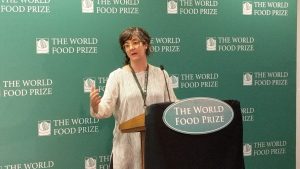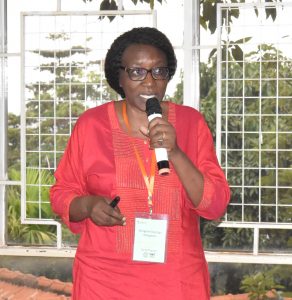[vc_row][vc_column][vc_column_text]

Dr. Hale Ann Tufan the GREAT Co-PI Cornell University USA has received the 2019 Field Borlaug Award for her work in gender-responsive crop breeding and agricultural research.
The World Food Prize event was held on 16th October 2019 in Des Moines Iowa, USA. Makerere University was represented by the Principal College of Agricultural and Environmental Sciences Prof. Bernard Bashaasha.
The Gender-Responsive Researchers Equipped for Agricultural Transformation (GREAT) is a five-year (2015-2020) joint certificate program funded by the Bill and Melinda Gates Foundation implemented jointly by Makerere University and Cornell University, USA.

At Makerere University, the project is led by Associate Professor Margaret Najjingo Mangheni from the College of Agricultural and Environmental Sciences. Dr. Hale Ann Tufan is the PI Cornell University USA.
A new five year $25 million USAID grant was announced during the award ceremony where Makerere University features as a key beneficiary. Makerere University will deliver gender and youth responsive crop breeding research training to all successful RFA grantee NARI research teams, building on the Great curriculum to include the gender and agriculture technology assessment methodology developed by CP for the INGENAES project.
The university will organize capacity building opportunities for gender researchers associated with CoE institutions around gender dimensions of agricultural value chains, including seed value chains, learning to use WEAI findings, gender and youth in seed systems, or other topics of interest.
This news is contained in a press release issued by Associate Director for Communications, International Programs Matt Hayes Cornell University titled, “New Feed the Future Innovation Lab to leverage top U.S. researchers and plant breeding technology to boost food security and alleviate poverty in developing countries”.
Cornell University will lead the new global crop improvement research program to advance plant breeding tools, technologies and methods aimed at delivering staple crops that can increase yields, enhance nutrition and show greater resistance to pests and diseases.

The establishment of the Feed the Future Innovation Lab for Crop Improvement (ILCI) will create an integrated research and delivery program with multidisciplinary expertise at the cutting-edge of agricultural development, from plant breeding and machine learning to quantitative genetics and gender inclusion.
Based in International Programs in the College of Agriculture and Life Sciences (IP-CALS), the project will support and empower national breeding programs in East and West Africa, South Asia and Latin America and serve as a model for introducing advanced agricultural technologies at scale to countries around the world.
The five-year, $25 million grant from the U.S. Agency for International Development (USAID), as part of the U.S. government’s Feed the Future initiative, was announced on Oct. 16 2019 at the World Food Prize in Des Moines, Iowa.
“We are in a critical point in history where booming population growth, climate change and other environmental factors are exposing threats of global food insecurity at an unprecedented scale. Improved varieties of key food crops are one of the surest avenues to reducing risks from economic, environmental and climatic shocks for millions of people in vulnerable and resource-poor populations.” said Innovation Lab director Stephen Kresovich, professor of plant and environmental sciences at Clemson University and a former vice provost for life sciences at Cornell. Part of the news release states.

Experts from Cornell, Clemson and Kansas State universities, along with scientists at the U.S. Department of Agriculture, Makerere University in Uganda, Cultural Practice and RTI International will initially collaborate with national agricultural institutions in Ghana, Haiti, Nepal, Senegal and Uganda to accelerate the breeding of locally and regionally adapted crop varieties targeted to smallholder farmers.
According to the release, the ILCI will serve as a catalyst for delivering improved tools, technologies and methods for breeding crops such as legumes, roots, sorghum and millet, with the potential to expand to a variety of staple crops in other countries.
The release indicates that currently, plant breeders at national agricultural research institutions (NARIs) develop locally adopted crops using breeding lines first created by scientists in country and in coordination with the international coalition of food security research programs known as Consultative Group for International Agricultural Research (CGIAR) centers.
Dr. Hale Ann Tufan, co-director of Cornell’s GREAT project who will also serve as ILCI associate director observed that the National institutions are positioned to address product profiles, market demand and environmental factors through the development of new varieties, but these programs are often underfunded and lack access to critical tools, technologies and methods needed to increase useful genetic diversity in crops and introduce varieties that advance economic growth, climate resilience and nutritional development goals.
 She said, empowering national research centers to achieve their own goals has the greatest potential impact on agricultural systems and for food and nutritional security.
She said, empowering national research centers to achieve their own goals has the greatest potential impact on agricultural systems and for food and nutritional security.
“The development of stable, nutritionally enhanced and gender and market- responsive varieties will contribute to poverty alleviation and improve food and nutrition security,” said Tufan. “Addressing young men’s and women’s roles in agriculture will make it possible for them to take up new agricultural and climate-smart technologies to earn incomes and cope with climate variability,” she added.
The Feed the Future Innovation Lab will work with NARIs to gain access to advanced tools, technologies and methods with the potential to accelerate the development of varieties.
Genomic resources allowing for the rapid discovery of novel plant traits will be combined with data-based simulations and optimization techniques to increase the efficiency of plant trait selection, breeding and varietal release. By building capacity and commitment through targeted investments in national programs and collaboration with scientists at top U.S. land-grant universities, the ILCI anticipates quick gains in productivity, quality and climate resiliency and reductions in poverty, gender inequality and under-nutrition.
 Competitive research grants provided by ILCI will encourage innovation and unlock opportunities for in-country scientists. The ambitious project has the potential to improve staple crops consumed by millions while also addressing vexing challenges like youth involvement, nutrition and food safety in. developing countries.
Competitive research grants provided by ILCI will encourage innovation and unlock opportunities for in-country scientists. The ambitious project has the potential to improve staple crops consumed by millions while also addressing vexing challenges like youth involvement, nutrition and food safety in. developing countries.
“In many regions where Feed the Future works, farmers grow outdated seed varieties often 15 to 20 years old, which lack resistance to pests, disease or weather- related shocks. This new Feed the Future Innovation Lab will be an important driver of change by enhancing crop breeding in ways that bring productive, resilient varieties to smallholder farmers, increasing their incomes and making nutritious food more available and affordable for low-income people in both rural and urban settings,” said Robert Bertram, Chief Scientist in USAID’s Bureau for Food Security.
Feed the Future Innovation Labs are led by U.S. universities in collaboration with partner country research institutions. The Innovation Lab for Crop Improvement will take a collaborative and multi-disciplinary approach to equip institutions and individuals to solve complex problems with scientific excellence and social benefit.
Integrating local capacity development into research activities is a prime focus aspect of the ILCI. Competitive research investments and funding opportunities will aim to build coordinated, high impact national programs utilizing local talent and knowledge.
The ILCI approach will empower the development of new crop varieties with a strong grounding in regional priorities and production systems and empower self-reliant programs that are positioned to tackle the most pressing challenges in agriculture and food security.
Report based on:
Press Release issued by
Matt Hayes (mmh285@cornell.edu)
(607) 423-1200[/vc_column_text][/vc_column][/vc_row][vc_row][vc_column][famous_grid_gallery][famous_grid_gallery_playlist_item img=”10119″][/famous_grid_gallery_playlist_item][famous_grid_gallery_playlist_item img=”10123″][/famous_grid_gallery_playlist_item][famous_grid_gallery_playlist_item img=”10124″][/famous_grid_gallery_playlist_item][famous_grid_gallery_playlist_item img=”10125″][/famous_grid_gallery_playlist_item][famous_grid_gallery_playlist_item img=”10127″][/famous_grid_gallery_playlist_item][/famous_grid_gallery][/vc_column][/vc_row]
